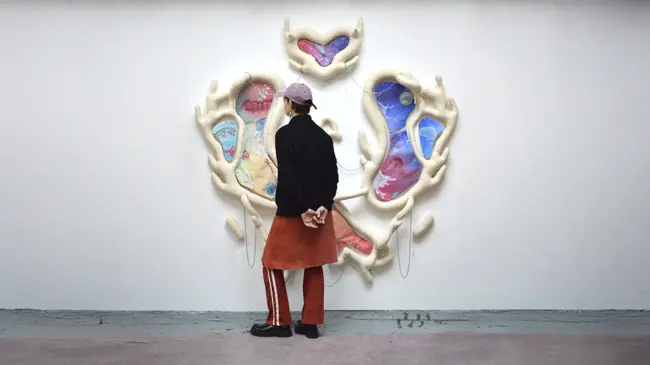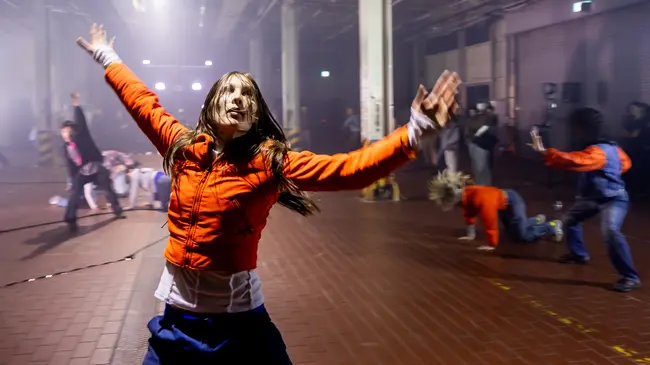Get rid of the idea of the singular artistic genius

Z33 is welcoming Pejvak, the long-term collaboration between Felix Kalmenson and Rouzbeh Akhbari. With their first-ever solo exhibition on European soil, If Need Be, the duo now brings us exclusive new works consisting of miniatures, sculptures, architectural interventions, and more. Through their polyvalent and intuitive approach towards research and living, they find themselves conversing with like-minded collaborators and histories, as well as various geographies. With equal attention to rumour, legacy, and historical fact, Pejvak now connects a series of hair-raising events of both the recent and distant past. The exhibition’s stories cover artificial glaciers, dams in the desert, and other human attempts to get a handle on water and its supplies.
Hi Felix and Rouzbeh, can you introduce yourself and your work?
Felix: Pejvak is the name of our artist duo, myself, and Rouzbeh Akhbari. We work in a range of mediums from film and video, to literature, sculpture, and installation. We have been collaborating since 2014 when we met at a residency in Casablanca, with our work over the years taking place in China, Canada, Turkey, and the Caucasus.
Our recent work is located between cultural spaces of influence, as I’m Russian and Rouzbeh is Iranian, we use that linguistic and cultural knowledge as a point of access. So in the past few years, we have been working in this so-called inter-imperial space contended by Russian and Iranian hegemony. What we are interested in are zones of contact and cultural, linguistic, ideological, and theological osmosis. These regions inherently challenge the notion of a historically stable monoculture and instead reveal the ways in which all identities are formed through dialogue and exchange, oftentimes accompanied by occupation but also through trade and cultural exchange.
We are interested in storytelling
Rouzbeh: We are interested in storytelling. Much of our work is informed by expanded field research which involves exposing ourselves to narratives, environmental elements, infrastructures, networks, and so on. It is through this exposure that we find ourselves intuitively drawn to collaborations and an enmeshing of elements that give life to the constellation of stories that become our practice.
How did you come up with the artist's name Pejvak?
Rouzbeh: ‘Pejvak’ literally means ‘echo’ in Persian. In the early stages of our collaboration, we spent a period of time in isolation in the mountains of Eastern Turkey and the Caucasus, where our collective’s name became even more resonating. We have always been inspired by the landscapes that surround us and by extension the narratives within them. We often think about how the landscape itself (or its depiction) can become interchangeable for words in the telling of a narrative.
Felix: I guess we were inspired by this notion that when you project an idea – here a sound – into a landscape (the world), the landscape shapes and echoes that sound back to you, however, distorted and modulated by the landscape. This is how we imagine our work, emerging out of this dialogue of echoes, allowing our ideas to both emerge from and be shaped by the landscape, be it cultural, geological, or historical...
Water seems to be the protagonist throughout the current exhibition. Why?
Felix: I’d say that the main theme of our exhibition is: 'How do we narrate crisis'? Whether it is concerning water scarcity or the sublime and devastating effects of this scarcity on a people. So the question becomes for us how we can speak to and from these stories in a way that draws together narrative threads and commonalities between these disparate struggles to unfold what is a planetary-scale crisis. So the exhibition becomes in a sense a world in miniature, drawing parallels between the present and past.
The exhibition becomes a world in miniature, drawing parallels between the present and past
Rouzbeh: The narrative capacities of infrastructures of water storage and access control are endless. Unpacking these infrastructures for the ways in which they narrate crises, allows us to see how much is implicated through the myths that came to life when large bodies of water were brought under control through human activity. The majority of what the visitor is encountering at the exhibition revolves around these concepts and myths that came to life in proximity to water (or lack thereof).
I can imagine that the current travel situation was rather bad for your creative process.
Felix: In the end, not that bad actually. (laughs) It forced us to work in a more literary way, which has been quite nice. Initially, it was challenging to depart from our usual methodologies but in the end, it allowed us to rely more on the broader network of collaborators that we’ve built over the years, which enriched the project with a diversity of perspectives and modes of creating.
Rouzbeh: We have always worked in a collaborative way. The way this pushed us into the literary realm was quite surprising at first, but then very rewarding in the way it all came together. For us, everything is negotiated and comes to existence through collaboration, but Covid and the impossibility of travel ultimately opened up our collaboration to many more people who undertook various aspects of our research and production process.
As Felix said before, it was almost a disadvantage at the beginning due to the complexity of things. But now we know it was a huge opportunity thanks to the establishment of a great network of collaborators.
Everything is negotiated and comes into existence through collaboration
Any tips for young artists who want to collaborate?
Felix: Firstly, it’s important to get rid of the idea of singular artistic genius. All ideas and creative capacities find their roots in a community of thoughts and practice. If you tune yourself into that and show the ability to be more honest about your own creative process, that’s already one huge step forward.
Collaborations also allow you to share and redistribute resources that are extremely difficult to access for young artists, creating a platform where friends with a range of skills can come together to build a mutual project.
Rouzbeh: I’d say collaborations give rise to a unique mindset that raises one's interest in a multiplicity of voices. The moment you overcome the barrier of singular thinking, the possibility is granted to open a potential path towards richer and more textured stories – which in turn will evolve into a unique artistic result.
Different Class works with the interest of their community at heart.
Our work’s purpose is to foster a solid network for independent artists, those who love them, and those who want to support them. Become a member to contribute to the local Belgian art scene.




